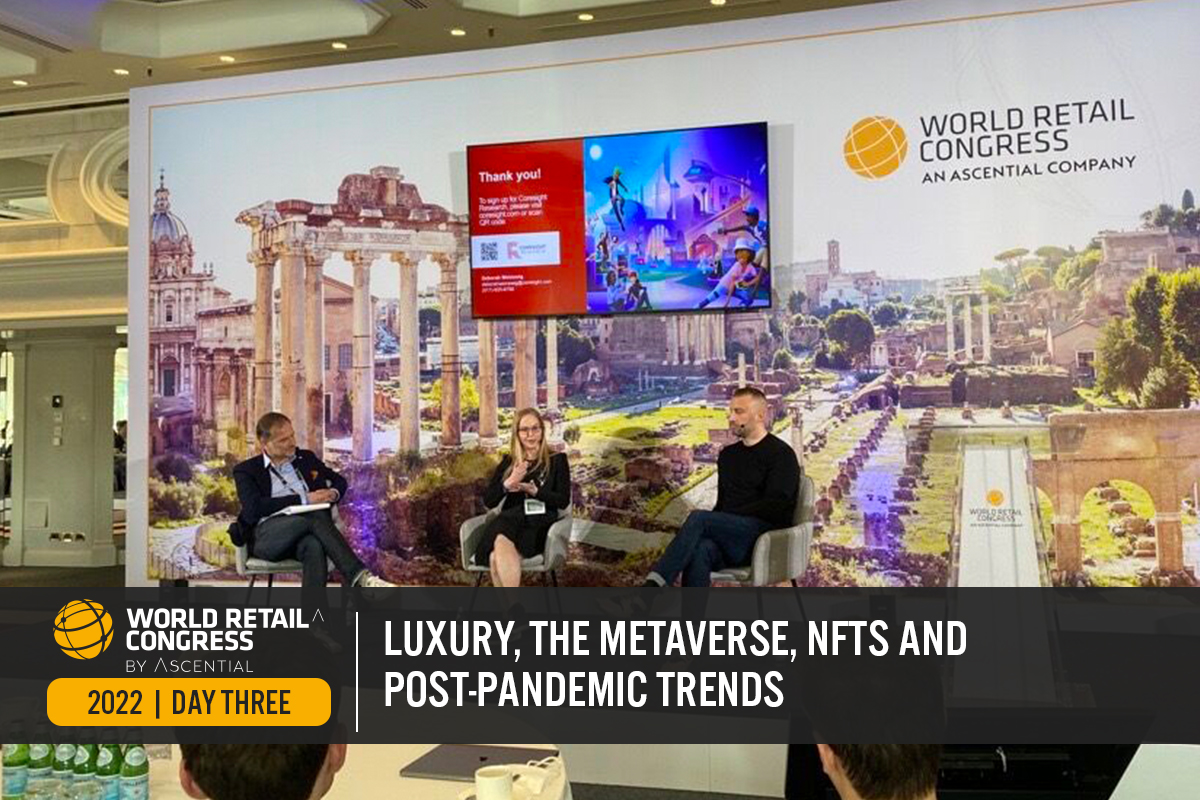
albert Chan
Introduction
The Coresight Research team attended and participated in this year’s World Retail Congress, held April 5–7, 2022, in Rome, Italy. The event featured retail leaders and industry experts from across the globe and was held in person for the first time since 2019.
In this report, we present our key insights from day three of the show, held on April 7, 2022.
World Retail Congress 2022 Day Three: Coresight Research Insights
10 Things Retailers Need To Know About the Metaverse
In the opening session of day three, Deborah Weinswig, CEO and Founder of Coresight Research, presented Coresight Research’s exclusive metaverse research to World Retail Congress attendees. As we estimate NFT (non-fungible token) sales totaled $12 billion in the first quarter of 2022 alone, Weinswig explained that it is imperative for retailers to “just get in there” with a test-and-learn mentality.
According to our proprietary data, 62% of metaverse users play games in the metaverse, while 46% use it to socialize, 34% use it to shop, 17% use it to attend virtual events and concerts, 17% use it to buy or sell cryptocurrency and 16% use it to buy or sell NFTs. For those unsure on where to begin, Weinswig explained the 10 things retailers need to know about the metaverse:- The metaverse is widely accessible to many who use the Internet.
- Gen Z will be the first metaverse-friendly generation.
- Established metaverse platforms have a global reach.
- Demand for virtual land is rising, as land supply in the metaverse is limited and more brands attract consumers to buy.
- Brands are creating immersive experiences within 3D games and the metaverse.
- NFTs and other digital assets are a new retail revenue stream.
- Cryptocurrencies enable buying and selling in the metaverse.
- Immersive technologies can improve customer experience.
- The metaverse can support retailers’ sustainability goals.
- Virtual IP protection will be vital in the metaverse.
Read more Coresight Research coverage of the metaverse.
[caption id="attachment_145235" align="alignnone" width="550"]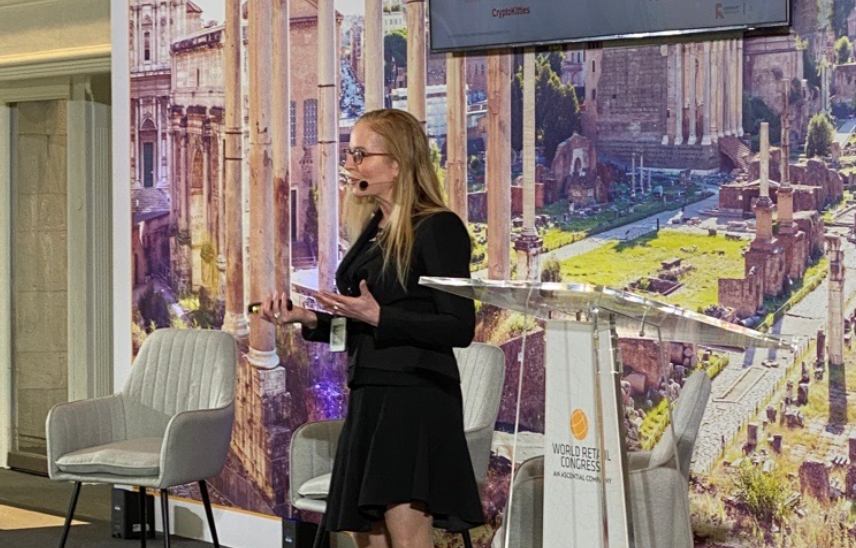 Weinswig presents 10 things retailers need to know about the metaverse
Weinswig presents 10 things retailers need to know about the metaverseSource: Coresight Research[/caption]
New Luxury Is Global, Virtual and Tailored to the Consumer
Marie Driscoll, Managing Director, Luxury & Retail, at Coresight Research, and representatives from Alibaba Group, Chalhoub and Cult & Rain, hosted a panel session offering consumer insights into the evolving luxury industry. As Christina Fontana, Director of Strategic Partnerships, Southern Europe, at Alibaba, explained, China has become a luxury pioneer, as the luxury consumers there are both younger and more tech-savvy than the average global luxury consumer. Likewise, while the Middle East had historically trailed five or more years behind leading luxury trends developed in China and other parts of the world, it has caught up. The Middle East is now just a year behind the leading luxury trends, “so what sticks in New York or China will be in the Middle East a year later,” Jasmina Banda, Chief Strategy Officer at Chalhoub, explained.
The metaverse represents a massive market opportunity for luxury brands. To that point, Cult & Rain is leading the luxury industry’s charge into the metaverse by becoming the first metaverse-born luxury brand. George Yang, Founder of Cult & Rain, proclaimed the metaverse as the definite future. Yang started Cult & Rain on instinct, noticing the large amount of time and energy Gen Z spends in the metaverse. Via metaverse avatars, consumers can express themselves in ways not possible in the physical world.
One of the ever-evolving methods of virtual self-expression is purchasing digital clothes, tailored to the consumer, via NFTs. The popularity of digital clothing will continue to grow, as evidenced by the Metaverse Fashion Week held in Decentraland, a metaverse powered by the Ethereum blockchain, from March 24 to 27, 2022.
[caption id="attachment_145236" align="alignnone" width="550"]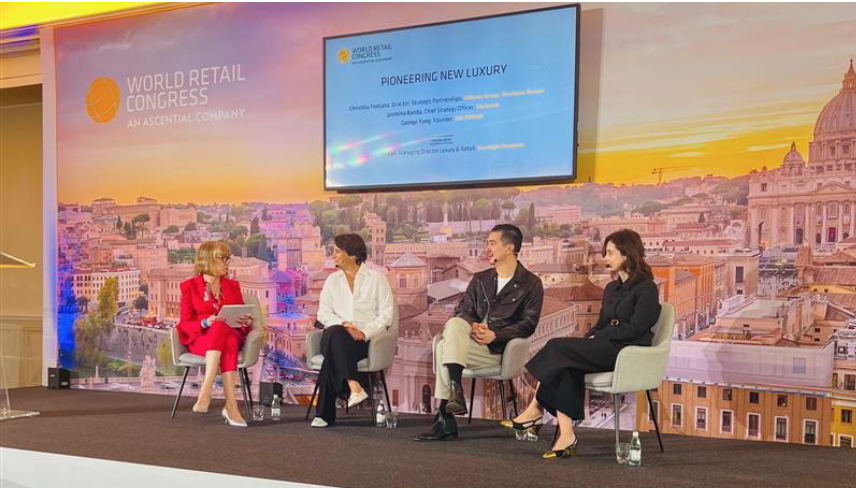 Left to right: Marie Driscoll, Managing Director, Luxury & Retail, at Coresight Research; Christina Fontana, Director of Strategic Partnerships for Southern Europe at Alibaba Group; George Yang, Founder of Cult & Rain; Jasmina Banda, Intelligence, Strategy and Growth at Chalhoub
Left to right: Marie Driscoll, Managing Director, Luxury & Retail, at Coresight Research; Christina Fontana, Director of Strategic Partnerships for Southern Europe at Alibaba Group; George Yang, Founder of Cult & Rain; Jasmina Banda, Intelligence, Strategy and Growth at ChalhoubSource: Coresight Research[/caption] A Winning Solution to Retail’s Sustainability Challenge Coresight Research spoke with Delia Negri, Aurora Macchi and Diletta Sveva Tamagnone, students from the ESCP Business School’s Master in Management program who won this year’s Future Retail Challenge (see our insights from day one of World Retail Congress). The challenge asked participants to rethink the business model of a fast-fashion brand, to “generate 25% of income from activities that reduce or replace the consumption of new physical products.” The winners chose H&M because they felt the brand best fit their initial ideas. While their ideas were initially three distinct plans, they ultimately evolved into a cohesive, multifaceted sustainability solution.
- Rent in-store. The students’ first idea—which is now the first step in their winning customer journey—was the one with the most traditional approach to sustainability: the rental model.
- Reuse in both worlds. Their second idea was also quite conventional in that it centered on the secondhand clothing market, but the students took a more personal and refreshing approach with the introduction of a video-gaming experience. This second idea was the bridge that connected the first, traditional idea with the third.
- Buy in the metaverse. The third aspect of the solution gives customers the possibility to buy, own and wear digital items. This is the most innovative approach to sustainability and the most thrilling one for this team to develop.
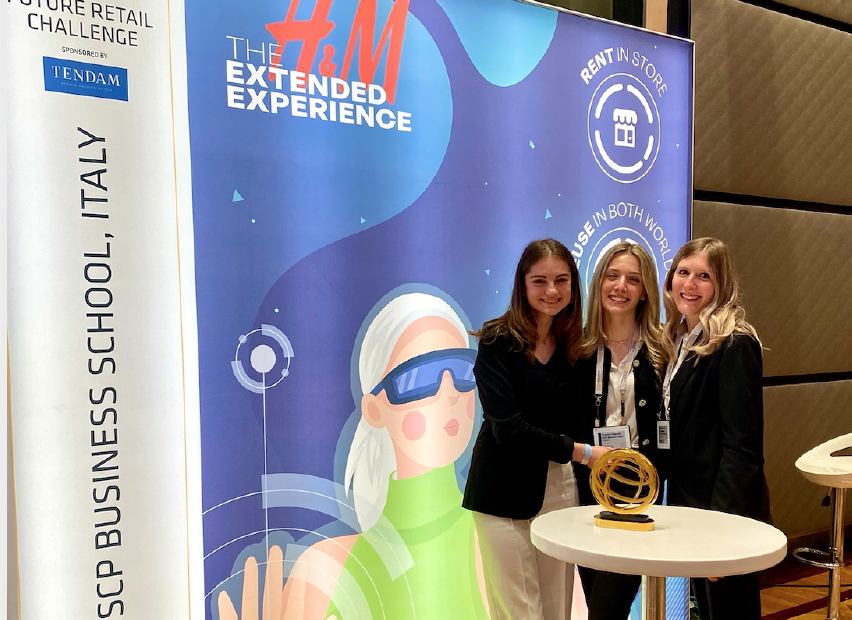 Left to right: Delia Negri, Aurora Macchi and Diletta Sveva Tamagnone, winning students in the Future Retail Challenge
Left to right: Delia Negri, Aurora Macchi and Diletta Sveva Tamagnone, winning students in the Future Retail ChallengeSource: Coresight Research[/caption]
Ahold Delhaize’s Clear Corporate Objectives To Promote Health and Sustainability
Multinational retail company Ahold Delhaize stated its corporate intent to help its customers eat well, as well as save time and live better through the food they consume. These objectives are supported by the company’s environmental, social and governance (ESG) agenda that focuses on reducing food waste and the use of plastics, selling healthy food and protecting the climate.
- Ahold Delhaize aims to reduce food waste by 50% in four ways: reduce (through technology, including electronic shelf labels), redesignate (through donation), re-energize (through new thinking) and rediscover (transitioning to healthier products that are also good for the planet).
- For plastics, the company aims to recycle (with drop-off bins at its stores), remove (ask CPGs and suppliers to discontinue the use of packaging) and return (eliminate redundant plastic internally).
- To promote healthy eating, Ahold Delhaize aims to reimagine food offerings to offer more nutritious food and redirect consumer habits by rating products on a scale of A to E in terms of healthiness.
- Finally, the company has set a goal of zero net carbon emissions by 2040. It plans to hit the goal by evaluating carbon dioxide emissions from transportation, its suppliers and partners, and its own products.
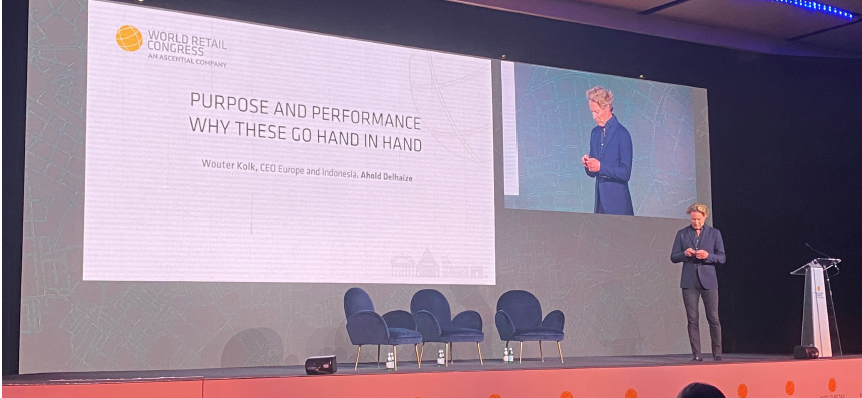 Wouter Kolk, CEO Europe and Indonesia, Ahold Delhaize
Wouter Kolk, CEO Europe and Indonesia, Ahold DelhaizeSource: Coresight Research[/caption]
Toys “R” Us Is Staging a Dramatic Return to the US Retail Scene
Founded more than 70 years ago, toy retailer Toys “R” Us endeared itself to many generations of families before an unsuccessful leveraged buyout led the company to file for Chapter 11 protection in 2021. However, while the company’s US stores closed, many of its international stores remained open.
Later in 2021, the company was acquired by investment firm WHP Global, and its new owner stated its four-initiative mission to bring the company back to consumers in the US and abroad:
- Toys “R” Us launched its first-ever NFT collection, bringing the company into the 21st century, reigniting nostalgia and reengaging customers.
- The company plans to expand further internationally, partnering with Flipkart in India and companies in the UK by the end of this year or early next year.
- The company opened a 20,000-square-foot, two-floor flagship store at the American Dream Mall in New Jersey, offering 10,000 toy stock-keeping units (SKUs) in the store and special experiences, including an ice cream café for kids.
- The company partnered with department store Macy’s to open 400 stores-within-a-store in 2022.
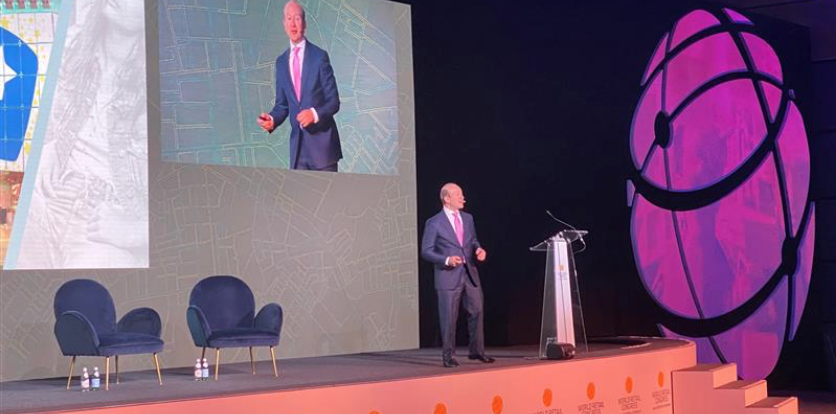 Yehuda Shmidman, WHP Global and Chairman & CEO of Toys “R” Us
Yehuda Shmidman, WHP Global and Chairman & CEO of Toys “R” UsSource: Coresight Research[/caption]
New Trends in a Post-Pandemic World
In a virtual fireside chat, Chip Bergh, President and CEO of Levi’s, and Susan Hart, Co-Leader, Global Retail, Apparel and Luxury Goods, at Spencer Stuart, focused on four prevailing trends that the pandemic accelerated to the front and center of the retail C-suite:
- Sustainability—Previously, sustainability was niche and a European-centric concern. Now, it spans all generations and countries, as climate change is a top concern of teenagers. For Levi’s, sustainability is a strategic imperative, and it plans to do what is in its control and influence what is not. The company has built its innovation program around sustainability, looking to reduce its chemical, water and landfill footprint. For instance, its “Water<Less” program can reduce up to 96% of the water used in denim finishing. Levi’s is also looking at fiber technology and alternative fabrics, such as hemp instead of cotton.
- Digitalization and E-Commerce—So much of business beyond online retail can be digitized, including design, supply chain logistics and operations, among others. Digitizing retail has simplified and streamlined Levi’s, making the company faster overall. As such, Bergh said Levi’s is quickly becoming a tech company.
- Supply Chain Resilience—In addition to the pandemic, geopolitical forces have rendered globalization dead. Chasing the lowest-cost manufacturing base around the world has been replaced by supply chain resilience and agility. Businesses now consider the benefits of closer to or in-market production. The new value is the confidence of having the right products on the shelf when needed.
- Cost Pressures and Inflation—Covid-19, supply chain inefficiencies and labor are driving higher costs.
Nigel Verdon, Co-Founder and CEO of Railsbank, unveiled exclusive new findings on changing consumer behavior in the just-released report, “The World View on Digital Retail’s New Consumer Personas.” The report identifies four new consumer personas:
- Digital Arrivals—Forced into e-commerce because of the pandemic, these consumers now appreciate and expect convenience, as well as frictionless shopping experiences.
- The Subscribers—This group of consumers started with Netflix, but moved on to subscriptions based around food and even cars. The subscription model changed transactional events into repeatable sequences.
- The Ethical Consumers—These consumers look to align purchases with their environmental and social values. This persona started with increased education and is currently driving many younger customers.
- Thrill Seekers—Technology is second nature to this group of younger consumers, (aged under 25), who never knew a world without the Internet or smart phones. They expect retailers to serve them in all capacities: channel-online, in-store or within the metaverse.
Simona Maggini, Country Manager, Italy, WPP, also joined the conversation via Zoom and commented on the nuances of the Italian retail market with its large independent retail base. Covid-19 forced small, single shops to adopt technology quickly, while fashion retailers adapted to working remotely with simple one-to-one social commerce. These stores are now evolving their retail form to a blend of on and offline, presenting a real opportunity for a customer revolution.
Genov, Maggini and Verdon all agreed on a core, fundamental principle: A better understanding of the customer is required. Retailers must remove bias and assumptions from their analysis, keep an open mind and not take anything for granted.
[caption id="attachment_145240" align="alignnone" width="550"]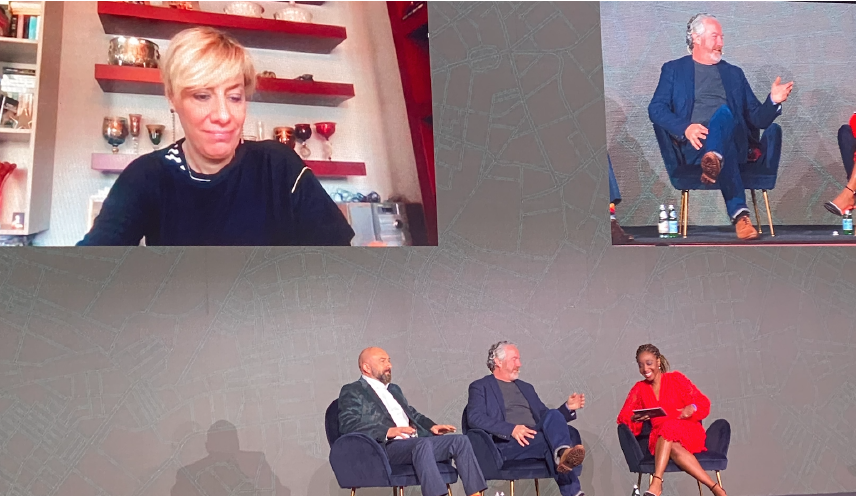 Left to right: Simona Maggini, Country Manager, Italy, WPP, (Zoom shot); Alex Genov, Head of Customer Experience Research at Zappos.com; Nigel Verdon, Co-Founder and CEO of Railsbank; and Lovelda Vincenzi, MC and Moderator
Left to right: Simona Maggini, Country Manager, Italy, WPP, (Zoom shot); Alex Genov, Head of Customer Experience Research at Zappos.com; Nigel Verdon, Co-Founder and CEO of Railsbank; and Lovelda Vincenzi, MC and ModeratorSource: Coresight Research[/caption]